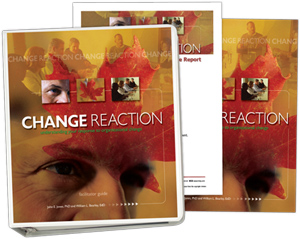 CHANGE REACTION INSTRUMENT
CHANGE REACTION INSTRUMENT
Available in both Online and Paper-Based Format
Organizational change is happening all the time. And when change happens, people respond in particular ways – whether or not they are aware of it.
Understanding one’s own reactions to change is the first step in dealing with it. An excellent starting point, Change Reaction is an effective learning tool for understanding personal reaction to change. The 24-item instrument helps individuals learn about their typical reaction to change – and identify ways to manage it effectively.
Learning Outcomes
- Determine one’s typical response to change: Resistant, Neutral, or Supportive
- Explore the behaviours that characterize the three responses to change
- Identify action steps one can take to embrace and foster change
Theory
Research indicates that organizations are in a continuous state of change and that some type of resistance is inevitable. No matter what type of reaction a person has, there is always motion in response to change:
- Some people have a natural tendency to move toward or support change
- Others are noncommittal and typically move away from change
- Still others typically move against change by resisting it and creating resistance to change in others
- The Change Reaction Model shows the three categories of responses to organizational change.
Uses for Change Reaction
Change Reaction works well as a stand-alone instrument as well as an effective component in any change management programme.
As a management training instrument, Change Reaction may be used to present the important aspects of change theory. In addition, it can be used to raise individual consciousness about people's responses to change, to plan more effective behaviour, and to improve organizational support systems.
As an organization development diagnostic tool, Change Reaction has multiple uses, including:
- Surveying norms regarding change
- Generating "force field" analyses of the forces impacting the change process
- Forming the basis for an educational intervention that will provide employees with information about themselves, change, and effects on the system as a whole